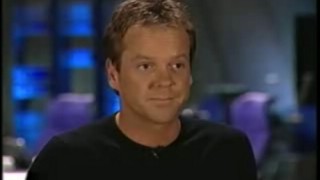Joel Surnow and Robert Cochran have a tough time believing that the high-concept, race–against-the-clock Fox drama series they co-created and executive produce, 24, could possibly be reaching its 100-episode milestone on Monday. There was a time, after all, when completing six or 12 installments of a show driven by such a complex formula appeared out of reach. But as series TV veterans, they persisted–and now here they are, armed with a two-year renewal (through Season 6) for a show that has a habit of reinventing itself every year to remain exhilarating and relevant. When they came up with the groundbreaking idea of an action-drama in which every hour episode would play as an hour in real time–taking us through a full 24-hour day each season–Surnow and Cochran had extensive writing and production credentials on such iconic shows as St. Elsewhere, Miami Vice, The Equalizer, Falcon Crest and JAG. But as Surnow and Cochran now tell Ray Richmond for The Hollywood Reporter, nothing on their collective resumes could have prepared them for the Byzantine undertaking they signed up for in producing 24.
The Hollywood Reporter: Did either of you believe the day would come when you’d be discussing a 100th episode of this show?
Robert Cochran: I’m one of those people who didn’t believe we could sustain this concept for more than one season. Making all of the puzzle pieces fit (each) week when the smallest thing in a given episode affects everything else was an enormous challenge from the start — and it still is.
Joel Surnow : When the pilot got picked up, we honestly had no idea how to do the show. No one had ever done a real-time series before. (The 1995-97 ABC drama) Murder One did a single story line through the season, and that helped. But real time can be unbelievably constraining.
THR: Is it true that the show was on the bubble for renewal after Year 1 but that its exceptionally strong DVD sales bailed you out?
Surnow: No. Actually, we were picked up in May 2002, and the full-season DVD didn’t come out for months after that. It did take a fair amount of persuasion to get brought back, though. What convinced Fox, I think, was the success we’d had with foreign sales, which was a big revenue stream for the studio. The biggest concern was if we could do it again and expect the audience to build from Season 1.
THR: Therefore, after making it to renewal, did you then have confidence that this premise could be pulled off over the long haul?
Cochran: Well, yes and no. We seriously considered changing the format for Year 2 so that each episode would stretch 24 hours. We wrote a prototype script for it, and … there was a point where I was really in favor of it. However, it wasn’t the show we’d set out to do.
THR: What exactly is it that makes “24” so much harder to make than other dramas?
Cochran: A big part is that we can’t do time cuts or jump around in time. When any other show or movie changes scenes, it can be 10 minutes later or five days later. They put a guy on a plane, and he can be there the next second. On this show, he’s on that plane for five episodes. From a technical point of view, it’s consistently daunting.
Surnow: Another thing is that a lot of shows are forgiven for sort of repeating certain plot twists and turns. But we can’t get away with it. We’re expected to go into new territory every time out.
THR: An awful lot happens to Kiefer Sutherland’s Jack Bauer over the course of a day and night. I probably wouldn’t be the first to point out that the nonstop calamity he endures might be seen as a tad, well, unrealistic.
Surnow: That’s certainly fair. I’ll tell you, though, we had a breakthrough in Season 4 where it seemed the audience didn’t care how many terrorist events happened in a day. If the characters were presented with a strong basis in reality, viewers went with us.
Cochran: We have an amazing staff of writers and producers and cast and crew who bail us out time after time to keep this show fresh and alive. That’s why we’re still here. And thank God for Kiefer. He’s the glue.
Source: Backstage / THR

